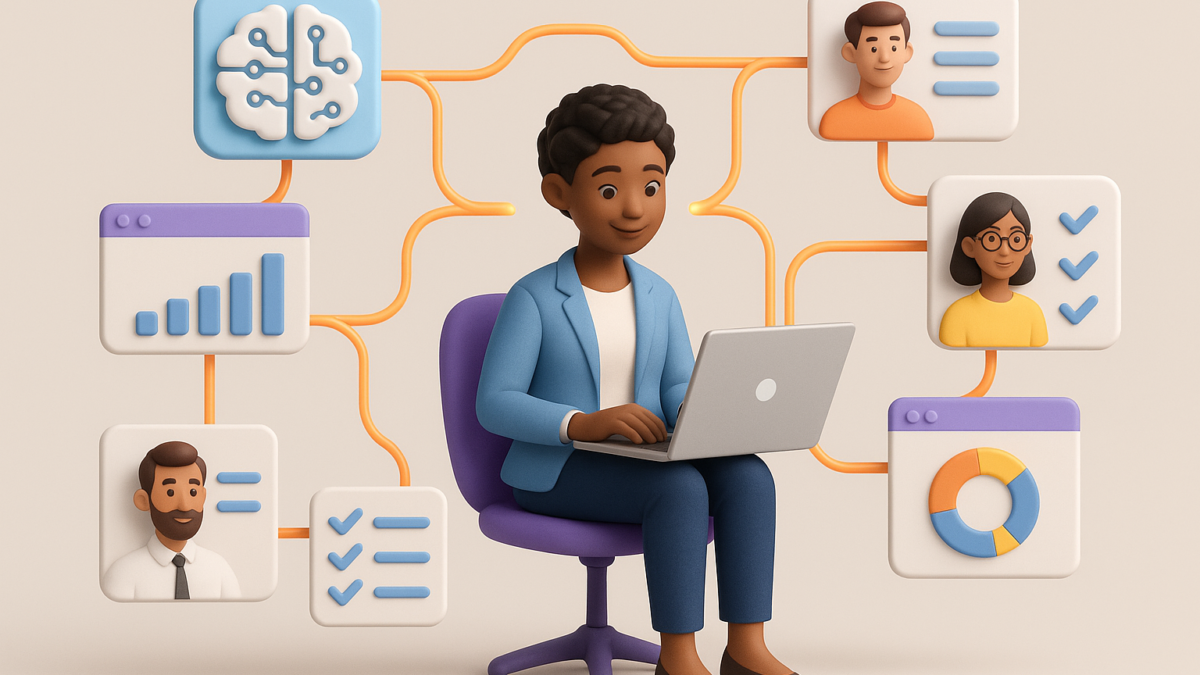Adaptive HR Tech: How AI Is Powering Hyper-Personalized Employee Journeys
Introduction: From One-Size-Fits-All to Hyper-Personalization
In the past, HR technology largely treated employees the same standard onboarding, fixed training modules, and rigid career progression. But in 2025, that model no longer works. Employees expect the same level of personalization at work that they receive from Netflix recommendations or Spotify playlists.
Enter adaptive HR tech AI-driven platforms that customize every stage of the employee journey, from recruitment to retirement. This isn’t just about better HR—it’s about boosting engagement, retention, and business performance.
What Is Adaptive HR Tech?
Adaptive HR tech refers to HR systems powered by artificial intelligence (AI) and machine learning (ML) that continuously learn from employee data and adjust experiences accordingly.
Instead of delivering the same programs to every employee, adaptive HR tech:
- Personalizes onboarding experiences.
- Suggests tailored learning and development (L&D) paths.
- Provides predictive insights on employee performance and retention.
- Recommends internal career opportunities aligned with skills and goals.
Why Personalization Matters in 2025
- Employee Expectations Have Changed
Gen Z and younger millennials want more than jobs—they want growth, recognition, and purpose-driven work. - Retention Pressures Are Rising
Turnover costs can equal 1.5–2x an employee’s salary. Personalization keeps people engaged longer. - Skills Are the New Currency
As industries evolve rapidly, companies must help employees constantly upskill to stay competitive.
See Also: Skills, Not Resumes: How HR Tech Is Building the Skills-Based Workforce of 2025
Key Features of Adaptive HR Tech
1. Personalized Onboarding
AI tailors onboarding journeys to the individual. For example:
- A new sales hire gets product simulations.
- A data analyst receives access to internal datasets and case studies.
This reduces time-to-productivity and boosts early engagement.
2. Dynamic Learning Paths
Instead of generic L&D modules, AI maps skill gaps and career aspirations to suggest courses, mentors, or stretch projects.
Platforms like LinkedIn Learning and Coursera for Business already integrate adaptive recommendations into enterprise HR systems.
3. Predictive Retention Analytics
Adaptive HR tech flags disengagement by analyzing behavioral signals—missed deadlines, decreased participation in meetings, or lack of learning activity—allowing managers to act before attrition happens.
4. Career Pathing & Internal Mobility
AI maps employees’ current skills to potential future roles, suggesting internal moves or projects. This empowers growth and reduces the urge to leave for external opportunities.
5. Personalized Well-Being Support
Well-being platforms connected to HR tech recommend stress management programs, wellness activities, or flexible scheduling tailored to individual needs.
Benefits for Organizations
✔ Higher Retention: Personalized growth plans reduce turnover.
✔ Increased Productivity: Employees ramp up faster with tailored onboarding and L&D.
✔ Agility: AI ensures the workforce adapts to new business needs quickly.
✔ Better Employee Experience: Engagement and satisfaction rise when employees feel valued as individuals.
Real-World Examples
- Unilever uses adaptive learning systems to provide customized skill development for over 150,000 employees globally.
- IBM Watson Talent Frameworks help enterprises align employee skills with evolving role requirements.
- PwC offers personalized “Digital Fitness” apps, giving employees customized learning experiences based on career stage.
Challenges of Adaptive HR Tech
Data Privacy & Trust
Employees may feel uneasy about being “tracked.” Transparency is essential.
Bias Risks
If AI systems are trained on biased datasets, personalization could reinforce existing inequities.
Implementation Costs
Enterprises need robust infrastructure and integration with legacy systems.
The Future: From HR Tech to Work Tech
Adaptive HR tech is part of a larger shift toward “Work Tech”—a holistic view of employee experience that blends HR, collaboration tools, productivity apps, and AI assistants.
By 2030, expect adaptive HR systems that not only personalize but also predict career outcomes, acting as AI career copilots for employees.
Conclusion: HR Tech That Works for People
In 2025, HR leaders face a simple choice: keep offering one-size-fits-all experiences and risk losing talent—or embrace adaptive HR tech that personalizes journeys at scale.
The future of HR isn’t just digital it’s deeply human, powered by AI that understands employees as individuals, not headcounts.
CTA
Want to stay updated on how AI and HR Tech are shaping the workforce of tomorrow?
Follow iTMunch for weekly insights into future of work innovations.
You May Also Like: The Future of Whitepaper Marketing: Syndication 2.0 in 2025





